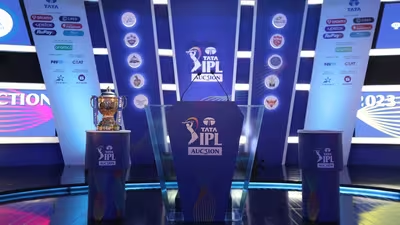
IPL Auction Rule Change Sparks Frustration Among Franchises
The recent announcement by the Board of Control for Cricket in India (BCCI) regarding changes to the Right to Match (RTM) rule has caused significant unrest among Indian Premier League (IPL) franchises. As teams gear up for the 2025 mega auction, the alterations to this critical rule have raised concerns about the fairness and competitiveness of the bidding process.
The RTM rule, which has been part of previous auctions, allowed teams to retain players by matching the highest bid made for them. This mechanism was designed to ensure that franchises could secure their key players while maintaining a fair market value. However, the BCCI’s revised approach to this rule has led to dissatisfaction across several franchises.
Under the new rules, if a franchise wants to use its RTM card, the team with the highest initial bid is given a chance to increase their offer before the franchise can exercise its right. This means that a team could initially bid, for example, INR 6 crore, but then raise it to INR 8 crore after the RTM team indicates its intention to match the bid.
This change has prompted concerns that it undermines the competitive nature of the auction. Many franchises feel that it gives a disproportionate advantage to wealthier teams, allowing them to inflate bids arbitrarily, which could penalize smaller franchises that might not have the same financial flexibility.
Franchises argue that the essence of the RTM rule—ensuring a player is retained at a fair market price—has been compromised. The new process complicates the decision-making for teams holding the RTM, making it harder for them to retain players without matching inflated bids that don’t necessarily reflect the player’s true market value.
In light of these changes, some franchises have formally lodged complaints with the BCCI. They contend that the revisions to the RTM rule shift the balance of power in the auction, leading to an environment where only the wealthiest teams can successfully retain their key players.
The governing body had initially aimed to create a more balanced auction process, but this new approach may inadvertently work against that goal. In addition to the RTM changes, the BCCI has also imposed significant retention fees, which could further strain smaller franchises. For instance, retaining players ranked fourth and fifth comes with hefty fees of INR 18 crore and INR 14 crore, respectively.
These financial hurdles, combined with the revised RTM process, may discourage teams from attempting to retain their best talent, ultimately altering the competitive landscape of the IPL. Franchises worry that the new rules could disrupt the auction dynamics and make it more challenging for them to build strong teams.
As the IPL prepares for this crucial auction, the outcome of these complaints and discussions with the BCCI remains to be seen. Teams are anxiously awaiting clarity on how these changes will impact their strategies and the overall structure of the league. The stakes are high, and the tension among franchises is palpable as they navigate this evolving landscape.